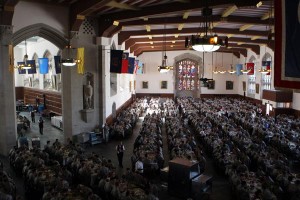For the last few weeks I’ve had some conversations with pastors of both big and small churches, talking about the future and different struggles they’re facing. A lot of this is based on size and resources, which, depending on the level your church has of each, can create vastly different environments. I wondered if the metaphors of dining room and mess hall are one way for us to explore and consider the benefits and struggles of the churches we call home.
Small churches are like dining rooms. They are cozy, and inviting (well, we hope, right?) and provide an atmosphere that fosters community fairly naturally. If you only see so many people per Sunday, you’re likely to get to know them better, and more quickly. The “food” here has the ability to be curated, fussed over, because it’s in boutique-style quantities. The chefs can think about the particular people they’re serving, and make accommodations. Because of their small size, they don’t have to spend a lot of time or energy on maintenance, which gives them a lot of room to dream and to imagine. In dining room churches, hospitality is personal and personalized; it’s a deep calling that anchors the place.
Big churches are like mess halls. (Side note here: I know mess hall sounds kind of negative and I don’t mean that…I debated using cafeteria, but that has such a negative “I’ll take this and that and only what I want” mentality that I thought mess hall was better, because it emphasizes shared community. If you think of a better term, share it in the comments!) They have the beautiful capacity to feed lots of people. They have room, and that room can provide so many opportunities to meet people, gather people, share with people. They are efficient, because they have had to learn how to be, so some of their processes run themselves and don’t require as much energy as they used to do. And they’ve hit that sweet spot of resources where they can expand their dollars by buying larger quantities, and get an even bigger investment in what ends up happening with them. Big churches can often do big things, effect big change, make big waves.
I know fantastic pastors in both of these types of ministry environments. They are doing good things with what they’ve been given and what they’ve created. The one thing that worries me when I see it is when these two environments are pitted against one another like enemies, or competitors, or some sort of mortal–or moral–choice. I just don’t buy into that. I think the world needs both. I also concede there are examples of each that are problematic and not living into the best version of their environment…and that should be talked about, critiqued and encouraged to change.
But I wonder if we wouldn’t be better served if we instead talked about how we can share gifts between us, even despite our very different environs. I know that big churches have done a number of things to create a “small church feel” in a big church environment through small groups, etc. and I think that’s great. But I mean this in a more aesthetic sense that goes far beyond just community building. What I mean is how we approach ministry altogether, and how we make it happen.
Small churches can experience such burnout by continually reinventing the wheel…or some new take on the wheel entirely. That creativity is both the fuel and the destructive fire of small (and particularly small emerging) churches. I remember after a few years of doing a creative response every. single. Sunday that I thought, “Seriously, sometimes there just isn’t juice for this this week. I have to let it go.” Nobody can be unique 52 weeks out of the year. But also, if these churches lose that aspect of their being, they lose a very real and central part of who they are…so there’s tension there. And sometimes a big church approach to that tension could be just the thing we need. Because small churches can tend to shy away from structures and processes, and that really hinders our ability to be sustainable..and also to scale up what we’re doing in any healthy way. I think there’s a way to add in just enough structure to smooth things along while still leaving plenty of room for creativity and flexibility. If we want to see good, healthy processes, we should talk to our big church friends and find ways to connect their wisdom to our own environment. Because they see these issues on such a big scale, they often have a better grasp of what is going on that can be lost on those of us so close to the ground and in the middle of the action, so to speak. They have a 10,000 feet perspective that is really valuable.
Big churches sometimes can find themselves stuck in the processes, though. They can feel slow and less adaptive out of sheer size…and sometimes as a result of all those processes in place, some of which are necessary, and some of which are just cumbersome. The volume of how many processes are necessary to run the place can also be difficult, because it takes up a good amount of the staff’s time. Just as small churches can learn from big church processes, big churches can learn from small church adaptability and creativity. An outside “small church” eye can look at a process, or workspace, or sanctuary, or gathering/small group and say, “Here’s how you can make some more creative room” and “Seems like you could get rid of this and this” and “How about introducing something like X?” They can look at the passions and unique characteristics of a big church and suggest ways to live into those more holistically and creatively.
The reality is, of course, that both church environments have efficient and creative aspects. But honestly, small churches flex their creative muscles more, and big churches flex their efficiency muscles more. That’s by necessity, and it’s not necessarily bad. I just think we should share our strength.
SO:
If you’re a small church, how can you learn from the wisdom of big church structures? How can you better manage resources, leverage time/energy, create systems that will work and make your work less cumbersome? Is there a big church pastor you can ask to coffee or lunch and learn from? S/he may have just the insight to an issue you continually face.
If you’re a big church, how can you learn from the creativity of small churches? How can you find space to be more adaptable or creative in the midst of what you’re doing? How can you provide your staff time not just to manage but to dream? How can you use your resources to try out (or heck, support anywhere in your community) creative events, endeavors and practices? How can you leverage your great gifts of room and resource in creative ways? Is there a small church pastor you can ask to coffee/lunch and brainstorm some creative next steps?


Mess hall works for me, even though our church is in the middle somewhere, like a Wednesday night church supper in the Great Hall. We are not the large corporate all-employee catered lunch. But sometimes we think we are. And, apparently, that is a good thing.